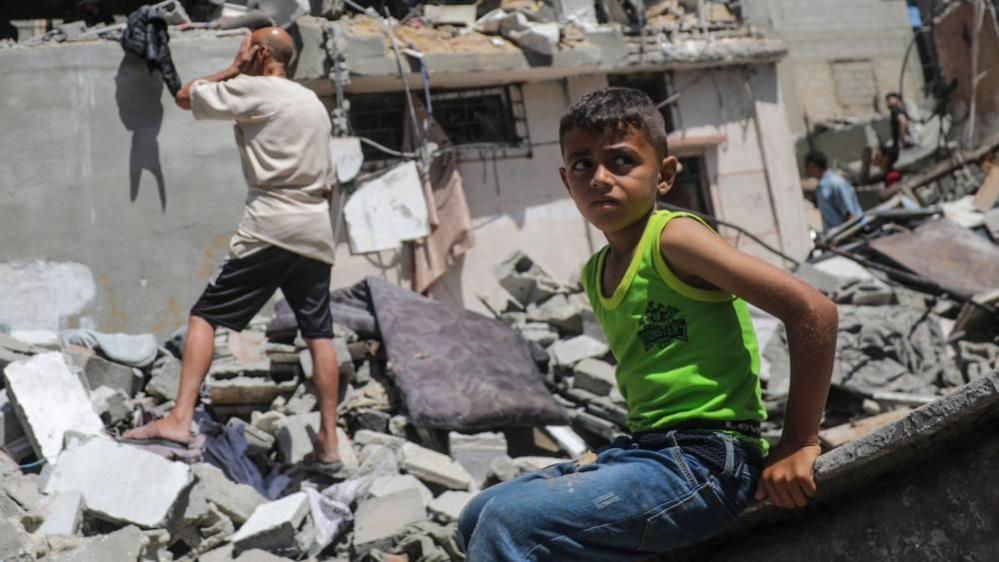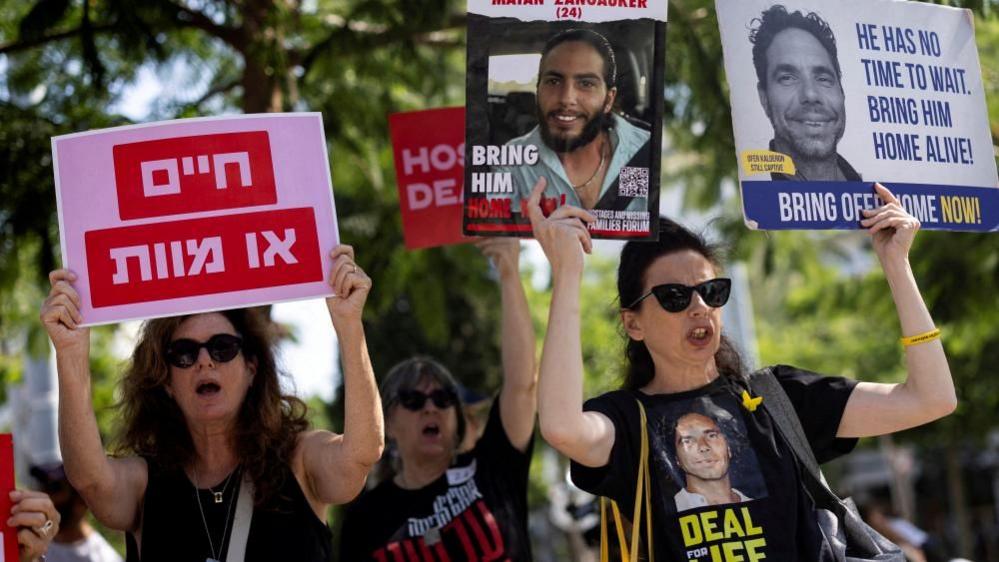Gaza: Long campaign by Israel may follow war

The war has been going on since the Hamas attack on Israel on 7 October
- Published
Israeli Prime Minister Benjamin Netanyahu's recent comments that the intense phase of fighting in Gaza was about to end essentially confirmed what has become increasingly clear in the past few months.
The Israeli army has portrayed its current operation in the southern city of Rafah as its last major ground offensive in Gaza.
It went ahead, despite concerted international opposition. It has involved Israeli strikes that have killed large numbers of Palestinian civilians. But it has not seen the remorseless level of bombardment that characterised earlier assaults on Gaza City and Khan Younis.
Israeli forces backed by tanks are still battling with Palestinian fighters in the west of Rafah, while the army continues to demolish swathes of buildings in the city.
The IDF has said that it has severely degraded three of the four Hamas battalions that it has said remain in Rafah, which was Israel's main aim. That holds out the possibility that the army may soon declare that the operation has been completed.
None of this has been any solace to the people of Gaza. There's been little or no respite for them. Casualty figures from the health ministry in Gaza - run by Hamas - are still recording around 40 to 60 deaths a day.
Israel is carrying out strikes every day elsewhere in Gaza - both in the north and in the centre. There is no current prospect of an end to this. Key to Mr Netanyahu's strategy in Gaza is the freedom for Israel to mount attacks when and where it considers necessary, even if at some point all its troops have been withdrawn from the enclave.
In Washington, the Israeli defence minister Yoav Gallant has been discussing with top US officials what he himself called Phase C - the third, less intensive stage - of Israel's campaign from relatively early on in the conflict.
He told the US special envoy Amos Hochstein in one of his first meetings during his four day visit that the transition to Phase C would "impact developments on all fronts, and that Israel was preparing for every scenario both militarily and diplomatically".
That message is one he will have continued to drive home in subsequent discussions with the US Secretary of State Antony Blinken and the Secretary of Defence Lloyd Austin.
A slow death alongside rubbish and rodents
- Published19 June 2024
Unable to back down, Israel and Hezbollah move closer to all-out war
- Published23 June 2024
The reference to all fronts is very much focused on the situation on Israel's northern border, where there's been a recent upsurge both in fighting and rhetoric in Israel's confrontation with the Lebanese armed movement Hezbollah. It's led to speculation that a new, all out war could be looming between Israel and another of its long-term antagonists in the region.
Mr Netanyahu has said that further scaling down the fighting in Gaza would free up troops to redeploy to the border with Lebanon. To underline the priority this front is increasingly assuming for Israel, Mr Netanyahu has been up near the border, observing a drill by troops.
The Israeli President Isaac Herzog has also just spent two days in the region, not just visiting the military but also several of the communities that have been affected by Hezbollah's near-daily attacks since 8 October. Lebanese communities have also suffered as Israel has struck back.
Day After
Whatever happens on Israel's northern border, the conflict in Gaza, even if at a far lower level of intensity, shows no sign of coming to an end. Moves towards a ceasefire have lost momentum again, with neither Israel nor Hamas appearing ready to fully embrace all elements of the proposal laid out by President Biden.
There's been much talk of what happens on the Day After. The Israeli war cabinet was dissolved by Mr Netanyahu after one of its members, Benny Gantz, left it, citing the prime minister's failure to lay out a post-war plan as the main reason for his resignation.
It's still unclear if there is such a plan. In a recent interview with a friendly Israeli media outlet, Mr Netanyahu said that it was clear that "military control in the foreseeable future will be ours".
He went on to give what were perhaps his most detailed comments so far on how he envisions the post-war situation in Gaza: "We also want to create a civilian administration, if possible with local Palestinians, and maybe with external backing from countries in the region, to manage humanitarian supply and later on civilian affairs in the [Gaza] Strip."
This chimes with what the Biden administration is hoping to achieve. Latest reports suggest that Egypt and the UAE are prepared to take part in a security force that might operate in Gaza after the war.
But the very concept of a Day After in Gaza may itself be somewhat optimistic. Hamas and Islamic Jihad fighters continue to be able to reappear in areas from where they were driven out earlier in Israel's campaign, in what has essentially become a form of guerrilla warfare.
The Israeli military's chief spokesperson, Rear Admiral Daniel Hagari has recently described the aim of destroying Hamas - making it disappear - as "simply throwing sand in the eyes of the public".
He said that Hamas was an idea rooted in the hearts of the people and that "anyone who thinks we can eliminate Hamas is wrong".

After more than eight months of war, about 120 hostages are still being held by Hamas
This is a message that does not appear to have got through to Mr Netanyahu.
He has held hard to his maximalist goal of a total defeat of Hamas, militarily and politically - although that may undergo some element of reformulation in the coming weeks and months. That is why he has continued to insist on Israel having the freedom to continue military operations when necessary, even if a ceasefire is agreed.
When he reiterated that in his interview with Channel 14, there were reports of disappointment among US officials that he was essentially negating the cornerstone of the ceasefire plan that President Biden not only announced but described as Israel's own proposal.
Hamas seized the opportunity to accuse Mr Netanyahu of preventing a ceasefire agreement - although officially the White House has put the onus on Hamas.
In Israel, the families of the hostages still held in Gaza - alive or dead - have also increasingly denounced Mr Netanyahu as being the main obstacle in the way of securing the release of their relatives.
In their latest demonstration, hostages' families again blocked roads across Israel. On one highway, they set a metal cage on fire, with the word Help emblazoned on it.
In a statement, they said: "Netanyahu has given up on the hostages. They can be buried in Gaza so long as he keeps his seat."
This third phase of Israel's war in Gaza may be at a lower intensity. But with no sign that it will end any time soon, the prospects of a ceasefire, the release of hostages and the beginning of a process in which Palestinians can rebuild their lives remain on hold.